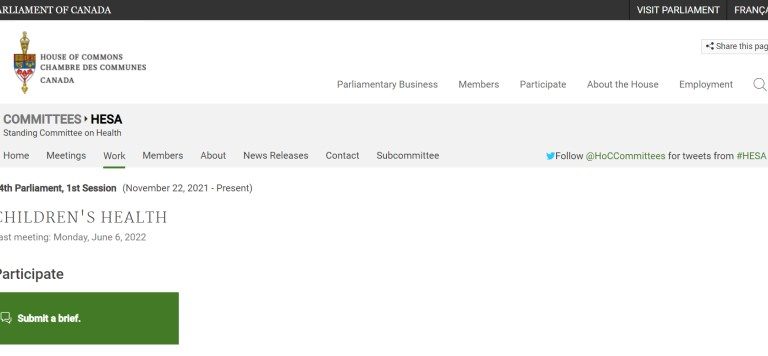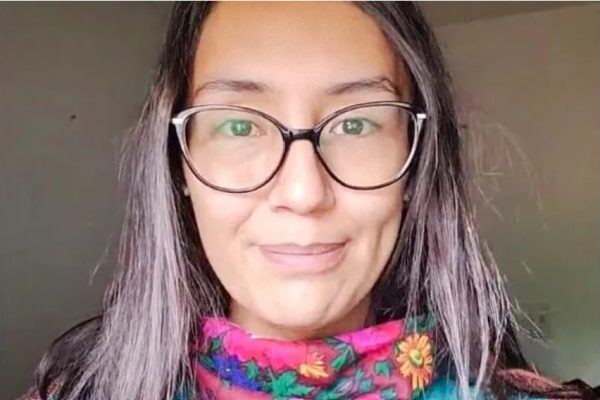A Joint Briefing Submitted on behalf of:
Gender Dysphoria Alliance, LGB Alliance Canada, Vancouver Lesbian Collective, Genspect and Canadian Gender Report
Now a matter of public record and published on the Our Commons website.
The Situation
Over the last ten years there has been a massive increase in the numbers of children and youth seeking medical gender interventions. Gender clinics for youth around the world have reported tenfold or greater increases in the numbers of referrals. The patient population has also undergone a radical change from a majority of natal boys and now consists predominantly of adolescent natal girls. (1)
During the same period, the previous treatment protocol of watchful waiting and psychological support has been replaced by an affirmative model which is centered on self-declared gender identity. This new model is being applied in a way that does not consider underlying mental health issues or the difficult transition of puberty that can bring with it many challenges including discovering one’s sexual preferences, dealing with body image issues, peer influence and seeking social in-group validation and social media binge behaviours. The result is that more people, especially young women, are finding that affirmative care has not helped their mental health but has left them with permanent physical changes, loss of function, pain and numbness and ongoing medical issues.
Many adolescent females do not “identify” as boys, but rather as “non-binary” or some other gender. Nevertheless, they are seeking out support and guidance from healthcare practitioners who in turn, have started to see their role as supporting a child’s “gender journey” and responding to children in distress with Lupron and other medical interventions. The Ontario based London Children’s Hospital, for example, has issued guidance to general practitioners to prescribe Lupron prior to referral to a specialized gender clinic and suggests that informed consent can be obtained from youth just entering puberty based on a cursory review of largely unknown risks. (2)
Shortcomings of the Current Model
Medical treatment of gender dysphoria was initially based on the “Dutch protocol” which was developed by researchers in Amsterdam. This consisted of puberty suppression at age 12, cross sex hormones at 16 and surgical treatment, if desired, after the age of 18.
The original Dutch protocol was supported by a study of 55 patients. The study reported that 1.5 years post surgery the patients’ gender dysphoria had been reduced and they were functioning well. There had been one death due to complications of surgery.(3) This protocol has been adapted far beyond the scope of the original intent which was to support the rare occurrences of children with severe and persistent early-onset gender cross-identification. Today in Canada, puberty suppression, cross sex hormones and surgeries are all being offered at younger ages without the thorough psychological assessment required in the Dutch clinic. (4)
Further, endorsements of the “gender-affirming care” model by several reputable North American medical organizations have been based primarily on lobbying efforts rather than sound science. Normally, clinical practice guidelines are developed through a process which is intended to be systematic, transparent and free from conflict of interest. The current clinical practice guidelines for gender-affirming medical interventions do not meet these standards. (5)
Stakeholder participation is an important part of clinical guideline development, but must include all stakeholders. Policy development on transgender issues is dominated by an activist community of transgender adults for whom medical interventions have helped. This excludes the concerns of two equally important affected groups. The first are people who experienced gender dysphoria as children only to have it resolve as they grew older. Studies have found that between 65 and 95 percent of children with gender dysphoria desist by adulthood. (6) Many of them become same sex attracted. This group is easily ignored because they have no reason to engage in political advocacy.
Another stakeholder group also being ignored in current policy are detransitioners. Studies of detransitioners have found that they transition damaged their physical health without resolving their mental health problems. (7,8)
It is difficult to determine the extent of detransition and regret. Studies conducted by gender clinics and transgender advocacy groups are not reliable because most detransitioners today report that they do not return to their gender clinics and disengage from the transgender community.
While existing guidelines call for a mental health assessment prior to medical transition and treatment of any co-morbid conditions, clinics frequently ignore these guidelines. Teenage patients are being referred for hormone therapy after only one or two short sessions with a nurse practitioner or social worker, even where there is a history of other mental health problems. Health outcomes are not being monitored as a condition of treatment.
International Developments
- Two countries have conducted a systematic review of treatment guidelines for gender dysphoria in minors and, in both cases, they have adopted guidelines which limit the use of medical transition.
In 2020 the Finnish Health Authority issued new guidelines for the treatment of gender dysphoria in minors which recommended that psycho-social support should be the first line of treatment. Puberty suppression and hormone therapy are permitted only in cases of severe and persistent distress and then only as part of a research study. (9)
The Swedish National Board of Health and Welfare has also completed a systematic evidence review of gender dysphoria and gender incongruence and issued new guidelines which are similar to the Finnish guidelines. (10) Change in Sweden reflected growing concern over the safety of hormonal treatment in children. The Karolinska Hospital recently reported that an 11 year old child developed serious osteoporosis while being treated with puberty blockers. (11)
In the United Kingdom, concern over practices at their main gender identity service for children prompted the government to initiate an independent review (“the Cass review”) The review commission issued an interim report in February, 2022 which found that there are significant gaps in the evidence base for treatment of gender dysphoria in young people. The reports notes that while there has been research on short term mental health outcomes, there has been very limited research on longer term regret and detransition. (12)
The Health Secretary is now looking into expanding the scope of the review to give access to NHS databases to enable the review to do long term follow up of patients who have undergone medical transition.(13)
The Royal Australian and New Zealand College of Psychiatrists recently issued a position statement on the mental health needs of people experiencing gender dysphoria. The policy acknowledges that the treatment of gender dysphoria in children and adolescents has been impacted by “polarised sociopolitical discourse.” The policy notes that there are multiple perspectives and views and does not endorse any specific guidelines for treatment. It notes that “evidence and professional opinion is divided as to whether an affirmative approach should be taken in relation to treatment of transgender children or whether other approaches are more appropriate.” It emphasizes that psychotherapy has a role in the treatment of both children and adults. (14)
In February, 2022, the National Academy of Medicine in France issue a press release which calls for the greatest caution in the use of puberty blockers and cross sex hormones in children and adolescents. (15)
In the United States, most of the debate has become politically polarized with the federal government strongly endorsing affirmative care and some states seeking to ban it entirely. However, there is also a broader debate in which many proponents of the affirming care model are beginning to express reservations. Laura Edwards-Leeper and Erica Anderson, two leaders in the field of gender transition, have spoken out about the failures of the affirmative model. (16)
Dr Marci Bowers, a leading gender surgeon, transwoman and incoming president of WPATH, has publicly stated that natal males who have had their puberty blocked at Tanner Stage 2 have “about zero” chances of ever being able to experience orgasm. (17) In addition, the Society for Evidence-based Gender Medicine is a U.S. based group of clinicians which is doing important work in questioning the current affirmation approach. (18)
Recommendations
1. Develop national guidelines for the treatment of gender dysphoria in children and adolescents in accordance with international best practices for guideline development. This would include a systematic literature review and a development process which is protected from conflict of interest and takes into account all relevant stakeholders.
2. Develop a comprehensive strategy to deal with detransition and regret which includes provision of mental health services to meet the needs of detransitioners and systematic studies to determine the prevalence of detransition and regret.
About Us
Gender Dysphoria Alliance is an advocacy group for people who experience gender dysphoria.
LGB Alliance Canada is a group that seeks to advance the interests of lesbians, gay men and bisexuals in Canada.
Vancouver Lesbian Collective is a group of lesbians committed to fighting against oppression, erasure and silencing of lesbians in Canada.
Genspect is an international alliance seeking the best support and care for gender questioning children.
Canadian Gender Report raises awareness and seeks open discussion on how gender ideology is impacting children and families in Canada.
References
1. Vancouver/BCCH clinic-community webinar [Internet]. Trans Youth CAN! [cited 2022 May 17]. Available from: https://transyouthcan.ca/results/vancouver-self-care-and-coping-webinar/
2. London Health Sciences Centre Guidance and Informed Consent Form for Lupron. Available from: https://genderreport.ca/gender-affirming-care-in-canada/
3. Vries ALC de, Steensma TD, Doreleijers TAH, Cohen‐Kettenis PT. Puberty Suppression in Adolescents With Gender Identity Disorder: A Prospective Follow‐Up Study. The Journal of Sexual Medicine [Internet]. 2011 Aug 1 [cited 2020 Mar 2];8(8):2276–83. Available from: https://www.jsm.jsexmed.org/article/S1743-6095(15)33617-1/abstract
3. Malone WJ. Time to Hit Pause on “Pausing” Puberty in Gender-Dysphoric Youth [Internet]. Medscape. 2021 [cited 2021 Sep 17]. Available from: http://www.medscape.com/viewarticle/958742
4. Dahlen S, Connolly D, Arif I, Junejo MH, Bewley S, Meads C. International clinical practice guidelines for gender minority/trans people: systematic review and quality assessment. BMJ Open [Internet]. 2021 Apr 1 [cited 2021 Apr 30];11(4):e048943. Available from: https://bmjopen.bmj.com/content/11/4/e048943
5. Kaltiala-Heino R, Bergman H, Työläjärvi M, Frisén L. Gender dysphoria in adolescence: current perspectives. Adolesc Health Med Ther [Internet]. 2018 Mar 2 [cited 2022 May 19];9:31–41. Available from: https://www.ncbi.nlm.nih.gov/pmc/articles/PMC5841333/
6. Littman L. Individuals Treated for Gender Dysphoria with Medical and/or Surgical Transition Who Subsequently Detransitioned: A Survey of 100 Detransitioners. Arch Sex Behav [Internet]. 2021 Oct 19 [cited 2021 Oct 19]; Available from: https://link.springer.com/article/10.1007%2Fs10508-021-02163-w
7. Vandenbussche E. Detransition-Related Needs and Support: A Cross-Sectional Online Survey. Journal of Homosexuality [Internet]. 2021 Apr 30 [cited 2021 Apr 30];0(0):1–19. Available from: https://www.tandfonline.com/doi/abs/10.1080/00918369.2021.1919479
8. One Year Since Finland Broke with WPATH “Standards of Care” [Internet]. Society for Evidence Based Gender Medicine. 2021 [cited 2021 Oct 8]. Available from: https://segm.org/Finland_deviates_from_WPATH_prioritizing_psychotherapy_no_surgery_for_minors
9. Summary of Key Recommendations from the Swedish National Board of Health and Welfare (Socialstyrelsen/NBHW) [Internet]. Society for Evidence Based Gender Medicine. 2022 [cited 2022 May 16]. Available from: https://segm.org/segm-summary-sweden-prioritizes-therapy-curbs-hormones-for-gender-dysphoric-youth
10. Jemsby C, Mattisson K. Leo skadades i transvården – nu har sjukhuset anmält sig självt. SVT Nyheter [Internet]. 2022 Mar 17 [cited 2022 May 18]; Available from: https://www.svt.se/nyheter/granskning/ug/sjukhusets-harda-sjalvkritik-efter-leos-transvard
11. Independent review of gender identity services for children and young people: Interim report [Internet]. The Cass Review; 2022 Feb. Available from: https://cass.independent-review.uk/publications/interim-report/
12. Crawford A. Sajid Javid to review gender treatment for children. BBC News [Internet]. 2022 Apr 23 [cited 2022 May 16]; Available from: https://www.bbc.com/news/uk-politics-61203575
13. The Royal Australian and New Zealand College of Psychiatrists. Recognising and addressing the mental health needs of people experiencing Gender Dysphoria / Gender [Internet]. 2021 [cited 2021 Sep 17]. Available from: https://www.ranzcp.org/news-policy/policy-and-advocacy/position-statements/gender-dysphoria
14. La médecine face à la transidentité de genre chez les enfants et les adolescents – Académie nationale de médecine | Une institution dans son temps [Internet]. [cited 2022 May 17]. Available from: https://www.academie-medecine.fr/la-medecine-face-a-la-transidentite-de-genre-chez-les-enfants-et-les-adolescents/?lang=en
15. Edwards-Leeper L, Anderson E. The mental health establishment is failing trans kids. Washington Post [Internet]. 2021 Nov 24 [cited 2022 Jan 14]; Available from: https://www.washingtonpost.com/outlook/2021/11/24/trans-kids-therapy-psychologist/
16. Dr Marci Bowers speaking at a panel at Duke University 2022 Available from:
https://www.youtube.com/watch?v=eYTKVwG7dG0
17. SEGM promotes safe, compassionate, ethical and evidence-informed healthcare for children, adolescents, and young adults with gender dysphoria. [Internet]. [cited 2022 May 22]. Available from: https://segm.org/home




Thank you Canadian Gender Report! I’m not able to become a public advocate at this point due to personal circumstances, but I am trying to do what I can to educate people by word of mouth, and to comfort fellow parents who are going through this incredibly difficult time. What can we do to influence healthcare policy while maintaining anonymity?